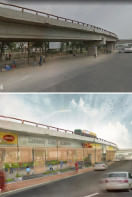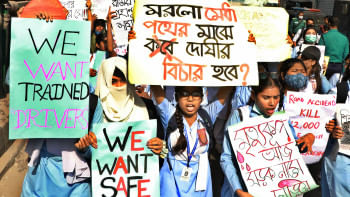Will road safety remain a mirage?

Road safety remains ever elusive in Bangladesh as the silent epidemic of road crash continues to wreak havoc. In November this year, 475 people were killed and 605 injured in 566 road accidents reported across the country, according to the data compiled by Bangladesh Jatri Kalyan Samity based on media reports. Meanwhile, the Road Safety Foundation (RSF) found—also by analysing media reports—that 467 people were killed and 672 injured in 541 road crashes in November. The RSF further reported that over 80 percent of these victims were aged between 18 and 65 years—the most productive segment of our population.
To get a better understanding of the extent of devastation caused by road crashes, here are some more numbers: per RSF data revealed in January, the loss of workforce caused by road crashes in 2022 amounted to Tk 23,460 crore in Bangladesh. Counting damages to property, the figure would amount to more than 1.5 percent of our GDP. It is widely believed that these numbers may not represent the real picture as many such incidents go unreported. Added to that is the emotional, psychological and financial trauma that every family of a road crash victim/survivor has to endure.
At this point, what can we say about this menace that has not been said already? We all know where the problem truly lies: long-standing systemic challenges that include poor road and traffic management, reckless driving, unfit vehicles being allowed on the streets, unskilled drivers, etc. We have yet to see the full implementation of the Road Transport Act, 2018, even though five years have passed since its passage in parliament. That is mainly because the authorities are unable to withstand the transport owners associations' lobby within the government. This lobby effectively blocks every measure taken by the government to ensure safer roads that could be unfavourable for these vested interest groups.
It is ironic that the government has made great strides in developing road communication in the country over the past decade or so—building bridges, expressways, culverts, roads, etc—but it failed to muster up the political will to counter the transport leaders' unreasonable influence in order to make these infrastructures safe for us to use. Six months ago, it rolled out a five-year project in collaboration with the World Bank, estimated to cost nearly Tk 5,000 crore, to make our roads safer. We are unsure how effective this project will be if the systemic challenges are not addressed. Concerted efforts from the relevant agencies are needed for this project and all other similar initiatives to bear fruit, so that our roads can be safe.

 For all latest news, follow The Daily Star's Google News channel.
For all latest news, follow The Daily Star's Google News channel. 










Comments